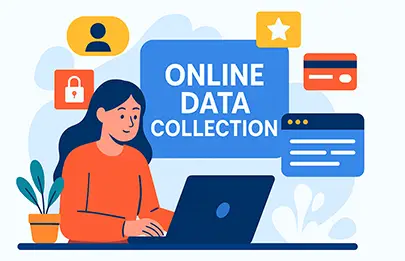Let’s be real: every time you visit a website, you’re giving away more than just your time—you’re giving away data. From your IP address to your shopping habits, your digital footprints are quietly being collected, analyzed, and sometimes even sold.
So if you’ve ever wondered, “Wait, how much do they really know about me?”—you’re not alone. And you’re asking the right question.
At Caldera Cybersecurity, we believe everyone has the right to understand how their personal data is being used—and how to protect it. Here’s what you need to know as a user in a world that’s constantly watching (digitally speaking, of course).
What Kind of Data Are Websites Collecting?
Most websites don’t ask for your data—they just take it. And it starts the moment you land on a page.
Here’s what they’re gathering (usually without you even noticing):
-
Your IP address and location
-
Browser and device details
-
Pages you visit and how long you stay
-
Click behavior, form entries, scroll depth
-
Search terms and referral links
-
Your login details, shopping cart contents, even what you hovered over but didn’t click
If you fill out a form, create an account, or make a purchase? That’s even more data—name, email, phone number, address, and potentially payment info.
And then there are cookies—those tiny files websites plant on your browser to track you over time. Some help (like remembering what’s in your cart), but others follow you across the web like a clingy ex.
Who Are They Sharing Your Data With?
Unfortunately, it’s not just the website you’re on that sees your data.
Many sites use third-party trackers—like ad networks, social media pixels, and analytics tools. That means your information could be passed along to:
-
Ad companies, who build a profile about you
-
Social media platforms, tracking your activity even when you’re logged out
-
Marketing services, trying to figure out what you’ll click next
And no, they don’t always ask for permission. You might’ve agreed in a cookie banner you didn’t read (we’ve all been there).
Why You Should Care
You might think, “So what? I’ve got nothing to hide.” But here’s the thing:
-
It’s your data. Your choice.
-
Data can be used to manipulate your decisions—ads, prices, even political content.
-
Data breaches happen—and your information could end up on the dark web.
-
You don’t know how far your data travels—or what hands it ends up in.
Data privacy isn’t just about hiding secrets—it’s about keeping control over your digital life.
How to Protect Your Privacy Online
The good news? You don’t have to be a hacker to take back control. Here’s how you can make your data harder to collect—and easier to manage.
Use Privacy-Focused Tools
-
Use browsers like Brave, Firefox, or DuckDuckGo that block trackers by default.
-
Install extensions like uBlock Origin, Privacy Badger, or Ghostery to block tracking scripts.
-
Turn on Do Not Track in your browser settings (some sites respect it, many don’t—but it’s still worth doing).
Say “No” to Unnecessary Cookies
-
Don’t just click “Accept All” on cookie banners. Look for “Customize” or “Reject All” options.
-
Clear your cookies and browsing data regularly.
-
Use incognito or private browsing mode for sites you don’t trust.
Hide Your IP and Activity
-
Use a VPN to mask your IP address and encrypt your traffic—especially on public Wi-Fi.
-
Avoid signing in with Google or Facebook on third-party websites—they’re data-sharing highways.
Strengthen Your Account Security
-
Use a password manager to create unique, strong passwords for each site.
-
Enable two-factor authentication (2FA) wherever you can.
-
Don’t reuse the same password across different services.
Actually Read the Privacy Policy (Sometimes)
Okay, not every line. But glance through to see:
-
What data they collect
-
Who they share it with
-
How to opt out
If it’s confusing or vague? That’s a red flag.
You Have Rights—Use Them
Thanks to data privacy laws like GDPR (EU), CCPA (California), and others, you can:
-
Request to see what data a company has on you
-
Ask them to delete your data
-
Opt out of data sales
-
Withdraw consent at any time
Look for links like “Do Not Sell My Personal Information” or “Manage My Data” in website footers.
Take Control of Your Digital Life
Here’s the bottom line: the internet was built for information sharing—but that doesn’t mean your personal info should be up for grabs.
You can’t stop websites from trying to collect your data—but you can make it harder for them to get it. And you can absolutely choose who gets to use it, and why.
Need Help Protecting Your Digital Privacy?
If you’re concerned about how your data is being used online—or you just want to feel safer when you browse—Caldera Cybersecurity can help.
We work with individuals, families, and businesses to secure their online lives, cut down on tracking, and build a safer digital environment. Whether you want to audit your privacy settings or learn how to lock down your accounts, we’ve got your back.
📞 (505) 975-4470
📧 info@calderacyber.com
🌐 calderacyber.com
Because in the digital age, privacy is power—and it’s yours to protect.



